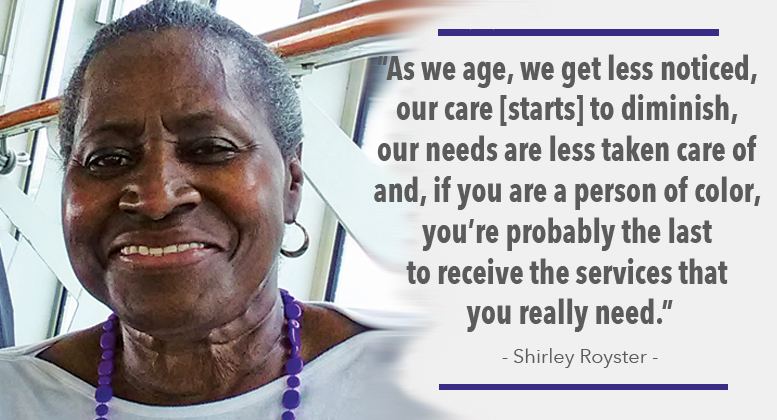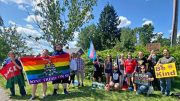LGBTQ Elders and LGBTQ Elders of Color face particular challenges.
New England Pride Guide 2018 | Special Edition
By: Mike Givens/TRT Assistant Editor and Nicole Collins/TRT Intern—
The Rainbow Times recently interviewed Shirley Royster, an LGBTQ elder of color, about issues facing seniors and the aging process.
The Rainbow Times: What are some key issues facing LGBTQ seniors?
Shirley Royster: I think some of the issues are getting quality care. We … will be needing assisted living programs [and] assisted care to stay in our homes. I will elaborate first about the senior programs.
Right now [in many assisted living facilities] if you are out, a lot of times you are [sat] in a corner, no one bothers you, no one wants to assist you because you are this gay person. And [being] gay is looked down on, even [among] seniors as it is … young people.
As we get older, we need more care. And, a lot of times, because we … were in the closet or we’ve lost our partners, we are really alone, and we don’t have families to come visit us.
So that’s, again, something that’s a real concern for us as we age and go into programs to assist us in living longer, while getting care as we age.
And the other [issue] is in housing. There is no senior housing allotted for [LGBTQ] people. We’re usually just stuck in housing—if we can find it with people who have mental health issues, people who have drug issues, and we are usually isolated because of that. Because it’s hard being in a community when that’s not … your community. And, making inroads as we age is very difficult.
We will probably need a lot of care as we age, to have people come in and assist us with staying in our own homes. And, right now, that does not exist.
Q: What are some key issues facing LGBTQ seniors of color?
A: Racism. People of color have always been discriminated against. And that has not changed as we age and as we go into our senior years. And that has never been addressed: racism against people of color or ageism. As we age, we get less noticed, our care [starts] to diminish, our needs are less taken care of and, if you are a person of color, you’re probably the last to receive the services that you really need.
If you’re out, a lot of us go back into the closet—especially if you’re a gay person of color—so that you can get basic care.
Q: What are some key issues that you see nowadays facing LGBTQ people that are completely different than the issues LGBTQ people faced when you were in your 20s?
A: When I was growing up … we had clubs. There were clubs that we would go into. And one club in particular was in Dudley Station. It was in the black community. It was called “Elite.” We had a big community, we had singers that would come in from the community, and we could go to clubs. The “1270” [and] we had a club in Cambridge, the “Other Side.” Those clubs no longer exist for us.
When we talk to young people now, they don’t have a central place where they can go. My understanding is that they have places they get on the internet and say, “We will meet up here at this time,” or, “we will meet up here at a certain date.” Or, “we’ll meet up here, and we’ll do this together.” But they don’t have a steady place where they all can gather at the same time and foster those relationships that we used to have when we were younger.
A lot of people I knew when I was in my 20s, I still have those people in my life because we fostered those relationships and we kept in touch over the years.
We’ve had programs where we’d had [comparisons] of young people now and when we were out in the street or out in our gay life. It’s definitely, definitely changed. We hear young people say, “We’re in the gay community in Boston; we’re in the black gay community in Boston.” I don’t know for sure, but I don’t think there really is one.
When I was in my 20s, for me, there was more sexual activity. We had to figure out how to keep ourselves safe. In other words, in this climate, as far as AIDS, as far as Hepatitis C, as far as even violence … on the elderly, I think there’s a whole different climate in how we maneuver ourselves in the community now.
If I am going to go out to the theatre, I usually try to get a group of us to go. I’m not hanging out by myself. I want to go with people that I know, people that I feel safe with and, if anything happens, I have some kind of a support with me. That’s what I mean about maneuvering as an elderly gay person.
Also, I think the way the community is now, there [are not] a lot of places where we can go that are safe. That’s why I think the elders of color group that I belong to has been so popular and has been able to function for the last thirty years that we’ve been in existence.
Q:Where do you see LGBTQ rights heading in the future?
A: I’d like to see us have more legislation around our health, around our housing and around our life.
I own my home with my girlfriend and I’d love to stay [here] and get the healthcare that [we] need. But that’s conditional. My partner and I—our incomes have to remain separate. If our incomes are together, then that diminishes how [many] services we can get.
We are stronger if we are supported by each other. I think we are stronger when we have the support of the younger people.
If we are supported by younger people, we can have a more extended life, better access to services … and being able to have friends—a community. Our community is enriched if we have younger people in our lives. The generational support from the younger people has been so valuable to us and we try to nurture that.
Q: Could you discuss key activities in the Boston area that seniors can do that will help address the common problem of loneliness and isolation that so many elders face?
A: Well, for us elders of color, we have something called “Flashback Sunday.” And we have four main functions a year. One … is a pool party, usually held in August. And we usually have an event in October … one of our health programs where someone comes in and speaks about diets, how to stay healthy [and] aging. In February, we have a march and another program that’s designed to, again, talk about how we can stay healthy, and how we can support each other. Right now, we’re gearing up for our Pride party.
We have a dinner program that’s done the second Wednesday of the month. It’s sponsored by Ethos. That’s held at Whittier Street, and [it’s] also well-attended by elders of color.
The elders of color are [also] talking about trying to sponsor programs where we can visit the elders who are not able to come out. Our website is up, and we will be putting out information on our website, also, to talk about things that are affecting us, things we can get involved in, places we are welcomed at—some ways in which we can be supportive to each other.
The website is https://lgbteldersofcolor.com.







